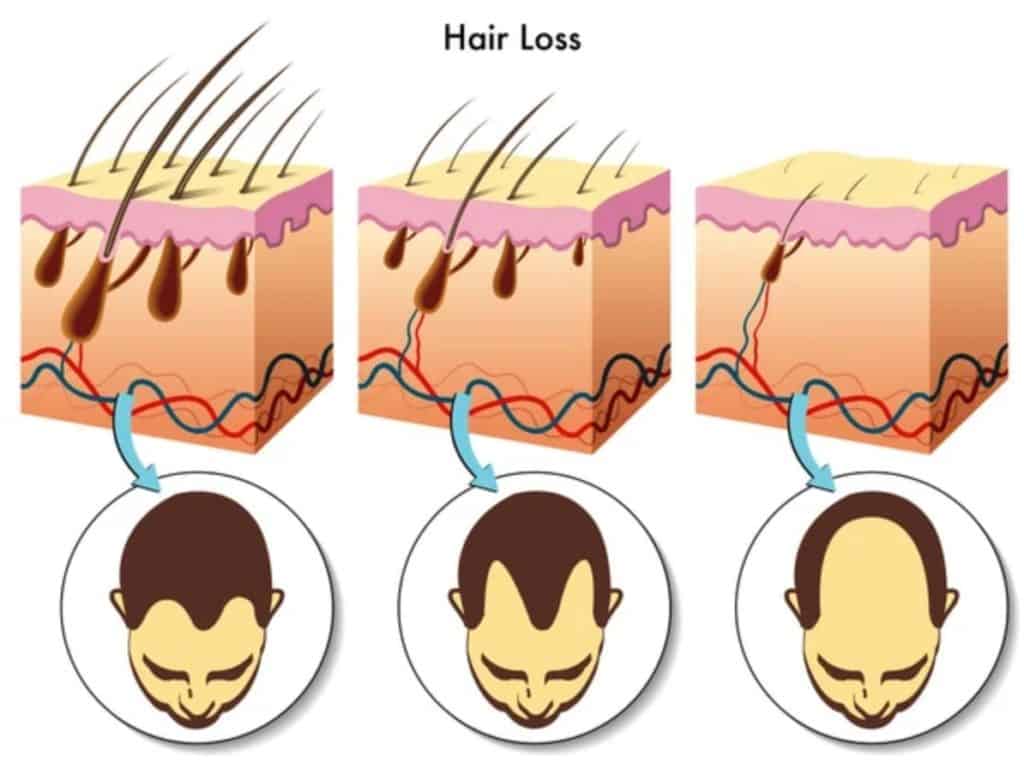Why Does Hair Loss Happen?
The average scalp contains about 100,000 hairs and it is normal to lose around 100 of them every day.
However, due to genetics, as we grow older gradually the number of hairs we lose increases in both men and women. This is called inherited hair loss and about half of all people get it by the age of fifty. Those with inherited hair loss are genetically more sensitive to testosterone, which causes hair follicles to shrink.
Overall, men’s bodies create larger quantities of this hormone. Therefore, some of them begin to lose their hair at the age of 21 and a large percentage has developed bald patches by the age of 40.
Women tend to lose more hair due to testosterone following menopause, after the age of 45. Nevertheless, shifts in their hormone levels because of changes in their menstrual cycle, childbirth and birth control pills can lead to hair loss even before then, but it usually grows back.
What Can Affect Hair Loss
Although, balding tends to come with aging, even children can suffer from it. Ringworm of the scalp is quite common in infants. Teenagers and young adults tend to suffer from a more rare cause of hair loss: trichotillomania. This is a stress-related compulsive behaviour, in which a person pulls hairs out from all over his body.
Another reason for hair loss regardless of age is malnutrition. Research has specifically linked it to lack of protein and iron. Furthermore, in some studies it has been connected to excessive smoking. When the individual develops a healthier lifestyle hair tends to grow back quite quickly.
It takes a long time (almost a year) for people that suffer from alopecia areata to grow their hair back. This disease specifically attacks hair follicles and results in round- shaped hairless patches on the scalp and the rest of the body or overall thinning hair.
Thyroid diseases (hypothyroidism and hyperthyroidism) if not treated, sometimes lead to hair loss as well, as do more rare diseases such as lupus and syphilis. The hair in these cases tends to grow back again when the patient takes the appropriate medication.
Cancer, both when left untreated and when treated with chemotherapy leads to non-permanent hair loss. In addition, certain medicines or medical treatments, such as blood thinners may cause hair loss in some individuals, but not permanently.
Finally, certain hair grooming products, hair dyes, curling irons and hairstyles weaken our hair and sometimes causes hair loss. A lot of our clients use Harley Street Hair Transplant Clinics due to the aforementioned issues.
Male Hair Loss
Male pattern baldness (androgenetic alopecia) is the most common cause of hair loss in men and studies have shown that is inherited from their mothers as it is found in the X chromosome. According to the American Hair Loss Association, between 65% and 80% of males will experience some degree of androgenetic alopecia during their lifetime. Typically the hair loss will start in the form of a receding hairline and then may also develop in the crown area.
Female Hair Loss
There are three primary types of hair loss in women: androgenetic alopecia, telogen effluvium, and non-pattern hair loss. Androgenetic alopecia is the most common form of hair loss in women. The pattern of hair loss in women with this condition is often less predictable than in men. There are many potential causes of telogen effluvium, including medication use, dietary tendencies, and stress. There are also rarer types of hair loss that fall into the ‘non-pattern hair loss’ category.
Conclusion
To conclude, hair loss is rarely a disease on its own, far from it. It is something that happens naturally to everyone. More excessive hair loss as we grow older is normal. However, because it might be an indicator of an underlying health problem if it persists for more than a couple of months you should inform your doctor about it or/and fill out the form provided for a FREE consultation with one of our hair transplant specialists.
Related Information
Find out more about hair loss by viewing other pages about the topic below:
Female Pattern Baldness
Affects: Around 8 million women in the UK
Most Common Type: Androgenetic Alopecia
Male Pattern Baldness
Affects: Around 7.5 million men in the UK
Most Common Type: Androgenetic Alopecia
Patient Testimonials
Aside from achieving fantastic results, we believe that keeping in touch with our patients before, during and after their hair transplantation procedure is paramount – it helps to keep our patients feeling calm and in control. We’re always on hand to provide guidance, support and aftercare advice. Time and again, our patients tell us that this is what sets us apart from other clinics.
You can read our great reviews of FUE hair transplants over on Google and TrustPilot






